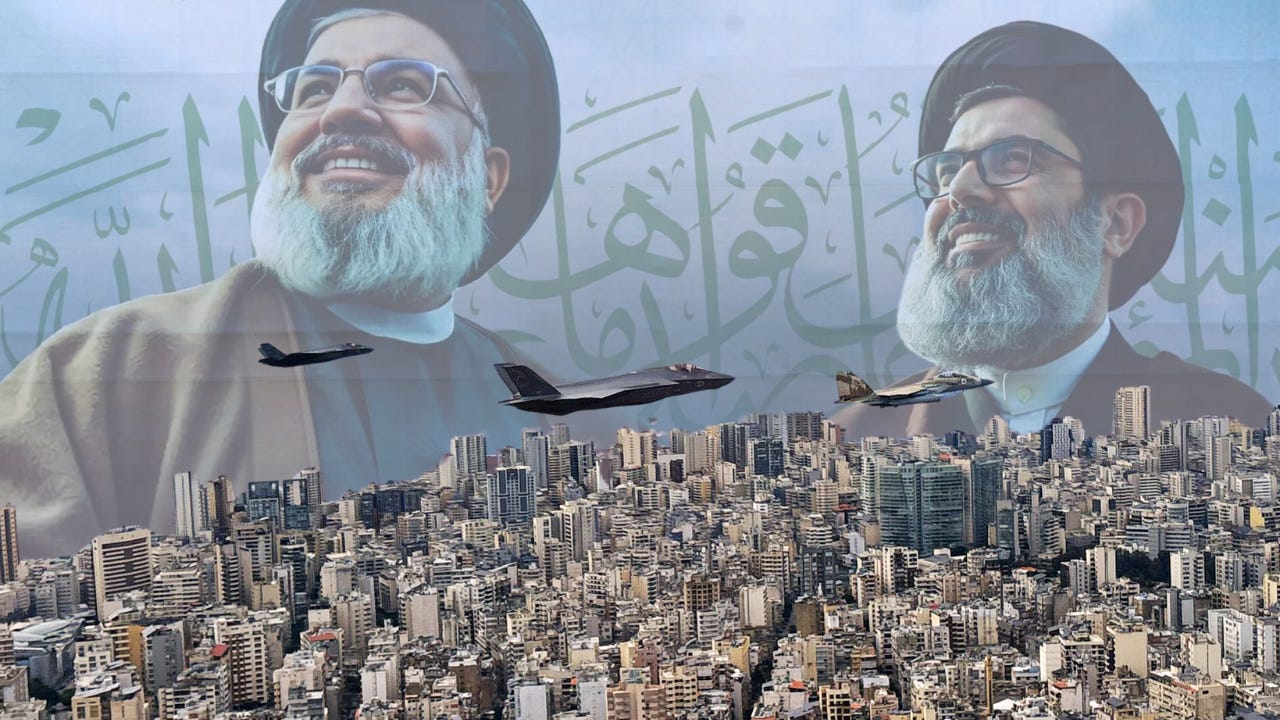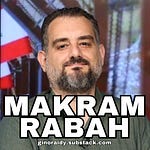Let’s start with the obvious: a lot of people attended Hassan Nasrallah’s funeral, nearly five months after he was killed in a massive Israeli airstrike on Dahieh. But the funeral was more than just a farewell—it was also an opportunity for a badly battered Hezbollah to demonstrate that it still had support.
Now, we can debate whether the turnout was a referendum on Hezbollah or simply a reflection of the deep reverence many of its supporters had for their longtime secretary-general. But that’s not the focus of this Monday’s post. Instead, it’s about what happened before, during, and right after.
Before we dive in, let me address those who felt deflated or concerned by the sight of a stadium packed with mourners, especially after sensing that Hezbollah’s presence had waned.
First, what did you expect? The image of people tossing their clothing onto the truck carrying the coffins—seeking a blessing—should make it clear that many truly adored Hassan Nasrallah. They were always going to pay their respects, regardless of how they felt about his final decisions and the devastating impact those choices had on them and the country as a whole.
Second, the heated rhetoric and back and forth, even in the comments on my Instagram, show a clear split among those ready to put aside his problematic legacy to let people mourn, and those that felt that that same legacy meant they were going to express their opposition to the decisions he had taken.
If you put yourself in their shoes—and I’ve touched on this in a previous episode, where I drew parallels between Barbara Walter’s How Civil Wars Start and Hezbollah’s current predicament—you’d see a familiar pattern: a faction losing power, leaning into sectarianism, undermining weak governance, and inventing new enemies to rally support.
Essentially, their party and leader were once seen as all-powerful, all-capable. Now, that sense of dominance is slipping away. Those who were once less privileged, along with former allies who benefited from loyalty to Hezbollah, are beginning to distance themselves. That shift leaves many feeling vulnerable and isolated.
No one likes losing power—especially near-absolute power. For Hezbollah’s supporters, seeing a president, a prime minister, and a government platform without the word resistance—long synonymous with Hezbollah—is jarring. In that context, the funeral wasn’t just about mourning; it was an opportunity to regroup, project strength, and pay tribute to a leader many deeply revered. Anyone who could attend was going to seize that moment.
The callous stunt by IDF jets was a clear violation of Lebanon’s sovereignty and the ceasefire both Israel and Hezbollah agreed to. They conducted a flyover during the procession, using the same jets used to strike and kill Nasrallah. This served two purposes. First, it reminded Hezbollah’s supporters why they backed the group in the first place: resistance against Israeli occupation of Lebanon. Second, in a more unspoken way, it underscored the group’s helplessness against an F-35 armed with cutting-edge weaponry, while their own arsenal remains largely stocked with Cold War-era Soviet unguided rockets.
It also highlights a deeper reality: something needs to change in how we approach the liberation of the five remaining points still occupied by Israeli forces after their withdrawal from most of the land seized during Nasrallah’s ill-fated war—one launched in a failed attempt to support Gaza.
Joseph Aoun & Nawaf Salam’s Tough Words to Iran’s Delegation
Mohammad Baqer Qalibaf, President of the Iranian Islamic Consultative Assembly, flew in from Iran to attend the funeral. During his meeting with Lebanese President Joseph Aoun, Aoun made a pointed remark that reminded me why I was so supportive of his candidacy:
"Lebanon is tired of fighting other people's wars on its soil. Countries should refrain from interfering in the internal affairs of others."
In other words, the most polite and diplomatic way of telling him—straight to his face—to fuck off and stop meddling in internal affairs.
During Qalibaf’s meeting with Prime Minister Nawaf Salam, another notable moment came when Salam stated:
"The security of the airport and its travelers is the responsibility of the Lebanese State."
This was a clear message following recent clashes at Beirut airport, where Hezbollah militants burned a UNIFIL peacekeepers’ vehicle. The Prime Minister reiterated that Iranian planes landing in Beirut must comply with Lebanese authority for authorization and searches—unlike before, when Hezbollah effectively controlled the airport. Iran had retaliated by temporarily banning Lebanese flights from landing there, but Salam’s stance made it clear: the airport and the safety of its travelers are Lebanon’s responsibility—not Iran’s.
The backdrop to all of this was the Lebanese Army conducting raids in Dahieh on the eve of the funeral, detaining wanted fugitives—including additional suspects linked to the UNIFIL attack—along with others wanted for violent crimes. Such operations remain relatively rare, and the government’s persistence in pursuing and arresting those involved is a significant shift. It signals that business will not return to usual and that those who break the law can no longer count on Hezbollah’s protection in Dahieh to shield them from law enforcement.
Both the words and actions of our new government have been promising and, frankly, refreshing. But the most telling indication of change came in the televised address by Hezbollah’s new leader, Naim Qassem, during Hassan Nasrallah’s funeral.
Signals from Naim Qassem during the Funeral
This speech signals an important shift—one that acknowledges Hezbollah’s weakened position, hints at a possible change in its military role, and attempts to reposition the party as both a political and diplomatic player rather than just a militant force.
Qassem reaffirmed the strength of the Shiite duo alliance with Nabih Berri’s Amal Movement. He also stated, “We will participate in the revival of the country and in building the state.” That’s a notable departure from the usual finger-wagging, my way or the highway threats. Instead, it struck a more conciliatory tone—an attempt to present Hezbollah as part of the solution in this post-Nasrallah phase.
The most significant moment came when he subtly hinted at the possibility of disarmament through a defensive strategy, though he softened the message for his frustrated base by adding that Hezbollah would not rely on mere ink on paper.
He emphasized that Hezbollah would continue its resistance but would first grant the state time to attempt to expel the occupation through diplomacy. This felt akin to when Arab politicians say, “at a time and place of our choosing”—which often translates to inshallah, meaning unlikely. Another good signal in such an important speech in timing and setting.
As for the Lebanese Army, he criticized it for confiscating weapons from Hezbollah’s warehouses and those of the Popular Front for the Liberation of Palestine (PFLP). This part was actually reassuring—it confirms that the Lebanese Army is seizing weapons caches, as Hezbollah had agreed to in the ceasefire, and as required by UN Security Council Resolution 1701, which ended the July 2006 war.
Could Qassem simply be paying lip service rather than genuinely signaling a shift? Perhaps. But his words, combined with the symbolic presence of the Lebanese flag alongside Hezbollah’s behind him, suggest a softer tone—about as close to an outstretched hand as Hezbollah is willing to offer.
In other words, it’s a foundation we can build upon. It signals the possibility that Hezbollah may eventually abandon the behaviors, attitudes, and policies that have long made cooperation difficult in this new reality we all share.
Final Thoughts
Hezbollah is at a fork in the road. Nasrallah’s funeral served as both a show of force and a moment of reckoning—a reflection of its enduring support but also a sign of the cracks forming within. The Lebanese government, for its part, has responded with rare defiance, signaling that the old status quo of unchecked Hezbollah dominance may be shifting. From Joseph Aoun’s blunt warning to Iran to Nawaf Salam’s firm stance on airport security, Lebanon’s leadership is asserting a level of sovereignty that would have been unthinkable just a few years ago.
Meanwhile, the Lebanese Army’s crackdown in Dahieh and its enforcement of UN resolutions suggest that Hezbollah can no longer assume that state institutions will look the other way. And in his first major speech as Hezbollah’s new leader, Naim Qassem struck a noticeably different tone—one that, at least in rhetoric, hinted at political engagement and even the possibility of disarmament under certain conditions.
The funeral was a moment of both defiance and vulnerability—an acknowledgment that the party is no longer untouchable. What follows will shape Lebanon’s future far more than the legacy of the man they gathered to mourn.














Share this post